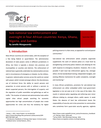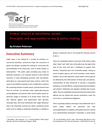The right to work in public spaces has recently become a highly contested issue; and the reality in most African countries is that those working in public depend on it for survival. Women make up the majority of workers in the informal economy in Africa and include market and street traders selling small items, food and fresh produce, hawkers, reclaimers and those operating small businesses, such as barbershops and hair salons. This fact sheet highlights the challenges of women working in public spaces in South Africa. The focus is five-fold, namely; (1) general observations on their working conditions, (2) knowledge of the law and policy-making process, (3) engagements between public space workers and sub-national authorities, (4) law enforcement and sanctions, (5) recommendations for reform
The socio-economic and political landscape in many African countries is characterised with inequality, poverty and high unemployment rates, forcing populations to turn to the informal economy for survival. The informal economy has since become the main economic driver in many countries, and is described as all economic activities conducted in public spaces by workers and economic units that are (in law or in practice) not covered or insufficiently covered by formal arrangements. The reality in several African countries is that those working in public spaces are generally vulnerable people, including women traders, migrants, reclaimers, as well as poor and homeless persons. Some of the challenges faced by these groups include onerous bureaucratic requirements for operation, restrictive municipal by-laws and regulations, harsh treatment by law enforcement officials, minimal sanitary services offered by local authorities and climate and environmental changes. The plight of these vulnerable groups is often overlooked by decision makers in policy-making processes. Yet, their activities significantly contribute to socio-economic development by alleviating poverty, creating informal employment, providing food security and offering recycling and sanitation services for municipalities and cities.
Sub-national law enforcement (when properly organised) supplements the work of national police at a local level by strengthening community-police relations and allowing for the swift response to emergency situations. However, this is only possible if each local law enforcement agency has, amongst others, formal standardised training, independent budgets, and existing effective mechanisms for public complaints, oversight and monitoring. This Fact Sheet provides a situational analysis of sub-national law enforcement in two west African countries, one east African and one southern African country; namely, Ghana, Kenya, Nigeria, and Zambia and highlights some of the challenges present in each context, particularly with regards to enforcement targeted at those working within public spaces.
Public space forms the setting for a number of activities, including the setting for community life and livelihoods of the urban poor, such as street vendors or waste-pickers. There is growing evidence pointing to the problematic way in which public space is governed. In many developing countries, laws and policies, particularly at a local government level, tend to restrict the ability of people to earn a livelihood or perform life-sustaining activities in public spaces. Contravention of local ordinances or by-laws is frequently treated as a criminal offence, compromising informal dwellers and workers’ livelihoods, denying due process protections and often violating their human rights. In this factsheet, we contextualise how laws and policies result in the criminalisation of the poor and consider principles that are fundamental to good policy-making.
Esta folha informativa discute o policiamento democrático como significando: (1) a obediência da Polícia ao Estado de Direito, (2) a responsabilização da Polícia, e (3) a justiça processual por parte da Polícia ao serviço do público. Nove dimensões necessárias ao policiamento democrático são identificadas, sendo que o resultado final pretendido é a confiança pública na Polícia, algo que resulta da sua legitimidade. O quadro conceptual apresentado não se destina apenas a descrever o policiamento democrático, mas também a orientar o planeamento estratégico nas organizações policiais, incluindo a Polícia da República de Moçambique (PRM).
This fact sheet deals with arrest without a warrant in Malawi. Currently in Malawi there remain laws on the statutes that have not been tested against constitutional requirements resulting in all likelihood in arrests that are not compliant with the Constitution.
This fact sheet focuses on arrest without a warrant in Kenya. Currently in Kenya the situation has been complicated by the legislative powers granted to the counties and some have used this opportunity to expand policing powers.
This factsheet deals with the power to arrest without a warrant in Mozambique. A 2013-decision by the Constitutional Council of Mozambique resulted in significant changes in law on who can arrest without a warrant, thus reducing the risk of arbitrary arrest. These changes and other developments bode well for reform in the criminal justice system. However, resource constraints place a substantive limitation on the Mozambican criminal justice system in general and specifically on complying with the 2013-decision of the Constitutional Council.
This fact sheet deals with arrest without a warrant in Zambia. It highlights the legal framework governing arrest without a warrant, the shortcomings in the legislation as well as some challenges with implementation as is evident from case law. The fact sheet recommends that the Zambian Criminal Procedure Code Act and the Police Act are reviewed and that the provisions on arrest without a warrant are amended to comply with international best practice on arrest in accordance to the obligations of the African Charter which seek to protect the right of life, dignity, equality and security of all people.
This fact sheet addresses alternative ways in which offenders of minor crimes can be dealt with at a court level using a more restorative justice approach. It proposes various forms of non-custodial sanctions that the court can impose; for example, community service, good behaviour orders as well as the completion of life skills programs.
This fact sheet addresses the role that prosecutors can play in dealing with offenders of minor crimes. It emphasizes the use of restorative justice approaches such as mediation, life skills programs and community service as a more appropriate way of dealing with minor offending rather than resorting to a criminal justice response.
This fact sheet addresses the role that law enforcement officials can play in dealing with offenders of minor crimes. It emphasizes the use of restorative justice approaches such as warnings and fines in combination with other programs as a more appropriate way of dealing with minor offending rather than resorting to a criminal justice response.




